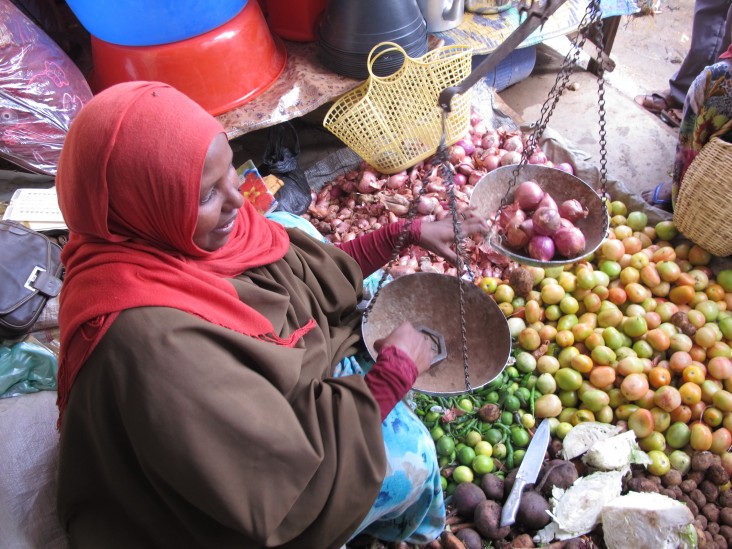
Democracy, Human Rights, and Governance
Transparent, accountable government and civil society are vital to cementing Somalia’s long-term stability. USAID and the international community are supporting the implementation of Somalia’s transitional roadmap, including the constitution-making process and preparations for national elections.
- USAID is helping to establish local governance institutions and build their capacity to reach out to constituents and civil society.
- USAID is directly supporting civil society’s active engagement in peace, reconciliation and reconstruction, with particular support for women and under-represented groups.
Economic Growth and Trade
In Somalia, assistance to improve markets and trade not only benefits the local economy, but also improves stability in the region. Unemployment or underemployment not only depletes families’ assets, but also sows discontent, making youth - especially young men - more vulnerable to indoctrination of violent extremist organizations.
Creating economic opportunities can help derail these efforts.
- USAID works to build vocational skills, improve access to financial services and open up new prospects for entrepreneurs.
- The youth livelihoods program seeks to reduce insecurity by providing skills training and employment opportunities to high-risk youth through local community-based partners.
Education
Somalia’s basic social services have been decimated due to civil unrest and years of underinvestment. USAID assists regional authorities and local communities by providing education services that mitigate conflict and improve the capacity of governance institutions to deliver quality and equitable services. USAID is expanding access to secondary education, and contributing to a more stable future by:
- Training new teachers and school administrators, especially women
- Developing curricula
- Providing books and school supplies
- Rehabilitating and constructing new classrooms, along with bathrooms, staff offices and sports facilities
- Expanding the provision of education services to pastoralists and other marginalized children via mobile schools using camels
Stabilization
USAID’s stabilization activities seek to increase confidence in all levels of government through targeted, strategic interventions that improve service delivery and government responsiveness. With USAID, Somali government institutions, the private sector, and civil society collaborate to design, evaluate, and deliver projects with a quick and lasting impact on the lives of Somali citizens in critical risk areas.
Community stakeholders collaboratively identify and prioritize the projects that will provide the greatest benefit to their communities. USAID is supporting over 850 projects in 17 of Somalia's 18 regions, focusing on high-risk communities in hard-to-reach areas, particularly those liberated from al-Shabaab control. Projects include;
- Roads built across Somalia, benefiting an estimated 5 million people
- Government buildings newly constructed to improve government’s capacity to deliver vital services in the regions
- Clinics, markets, bridges and irrigation canals rehabilitated, improving the lives of citizens and increasing confidence in local goverrnment service delivery
- Garbage trucks delivered, boosting the governments ability to address solid waste management and sanitation, building trust between citizens and the local government
- Trained technical staff that is embedded in Ministries across Somalia to improve government capacity
- Solar powered streetlights installed, increasing urban safety and security
- Employment opportunities created to improve livelihoods, reducing the risk of youth joining extremist groups
- Government-community dialogue events organized to build trust in the government and sustain activity impact
- Reconciliation and social cohesion forums organized across Somalia, reducing the risk of conflict
Hundreds of youth are also receiving vocational training in entrepreneurship, mechanics, electrical repair and installation, to name a few courses. Many have found employment with their new skills and have even opened up businesses. With money in their pocket, and hope for a better future, violent extremism is a less attractive option.
Working in Crisis and Conflict
Between February and June 2016, more than one and a half million people in Somalia will likely experience Crisis or Emergency, with people in the north and internally diplaced peoples (IDPs) comprising the most food-insecure populations, according to the USAID-funded Famine Early Warning Systems Network (FEWS NET). Following two years of below-average rains in northern areas of Somalia, drought conditions are particularly pronounced, according to the UN. Drought in these northern areas - exacerbated by the strong El Niño climatic event - has compounded the challenging humanitarian conditions in northern Somalia. As of March, the UN estimated that 385,000 people in northern Somalia were experiencing acute food insecurity, with a further 1.3 million people at risk of facing acute levels of food insecurity. In total, approximately 1.7 million people, nearly 40 percent of the population in Somaliland and Puntland, require humanitarian assistance and livelihood support.
The USG - consistently Somalia’s largest bilateral humanitarian donor - is providing critical humanitarian assistance in the country, including supporting efforts to address Somalia's food security situation. In FY 2015 and 2016, USAID/Food For Peace has provided more than $147 million in humanitarian support to populations in Somalia, including emergency food assistance, nutrition interventions, and livelihoods programs.
USAID continues to monitor conditions, identify needs and facilitate coordination and information sharing among international relief organizations to increase aid effectiveness.
Regional Profiles
Interim South West Administration
Related Resources
Supporting education in Somali schools: A New Start for Burtinle High School.








Comment
Make a general inquiry or suggest an improvement.